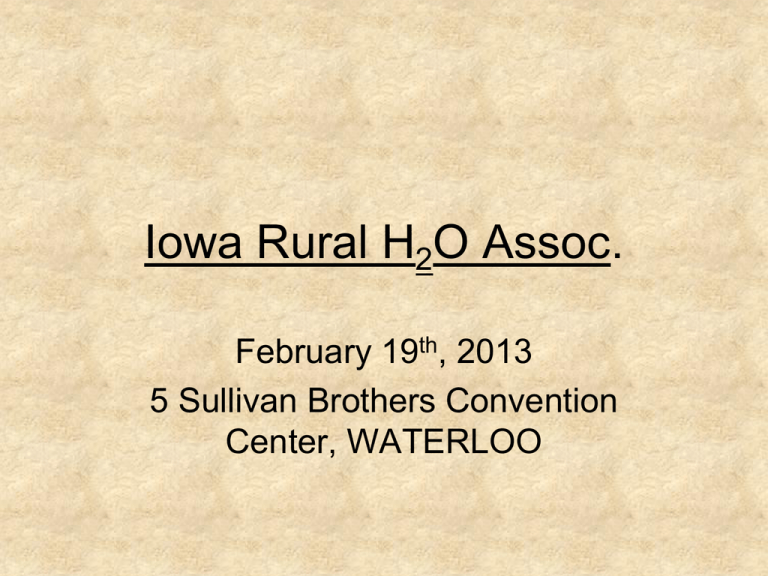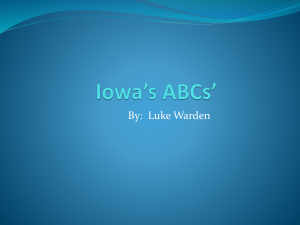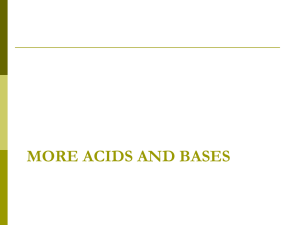beneficial use - Iowa Rural Water Association
advertisement

Iowa Rural H2O Assoc.
February 19th, 2013
5 Sullivan Brothers Convention
Center, WATERLOO
Drought: 2011-12-13?
How Does It Affect Your System?
Michael Anderson - DNR – w/ asstce frm Iowa Geological & Water Survey
“declining” water table
Des Moines River
Van Buren Co.
Iowa’s Driest Summer Months
•
•
•
•
•
•
•
•
•
•
1.
2.
3.
4.
5.
6.
7.
8.
9.
10.
July 2012
July 1886
July 1936
July 1894
July 1975
August 1984
August 2003
August 1901
August 1971
August 1947
0.47”
0.50
0.52
0.72
0.95
1.04
1.05
1.29
1.30
1.48
{AUG 2012 2.95}
From Harry Hillaker - IDALS
Iowa’s Hottest Months
•
•
•
•
•
•
•
•
•
•
1.
2.
3.
4.
5.
6.
7.
8.
9.
10.
July 1936
July 2012
July 1901
August 1947
July 1955
July 1916
July 1934
July 1935
August 1936
August 1983
83.2
82.8
82.2
80.4
79.7
79.5
79.4
79.2
78.9
78.8
{Aug. 2012 71.2}
From Harry Hillaker - IDALS
What’s the Big Deal about Heat?
• 90°
13% greater drying potential than at 86°.
•
•
•
•
37% greater.
54% greater.
74% greater.
95% greater.
96°
100°
104°
108°
From Harry Hillaker - IDALS
JANUARY
• The new year has been very dry with a nearrecord low pace of precipitation into the 27th.
There was 1 statewide rain event on the 10th11th, with 0.7 inches to Fort Madison. However a
far more active weather pattern prevailed the
last few days of January, with two larger
statewide rain events on the 27th and 28th-29th.
Rain amounts of over an inch were common
over eastern Iowa.
January, continued
• A statewide average of 0.7 inches of snow fell
through the first 4 weeks of January. However,
heavy snow fell from SC through NE IA on the
night of the 29th into the 30th. Storm totals of 7
to 8 inches were common from Indianola to
Guttenberg. Despite the late-month storm, the
statewide average snowfall was only 3.6 inches
or 4.1 inches below normal. This was the lowest
January snow total since 2006 and ranks 19th
lowest for the month among 126 years of record.
January (Summary)
• Monthly precipitation totals were
above normal across eastern
Iowa and well below normal over
the northwest.
Here is the source of a lot of our
basic information
• National and local databases…
Real-time streamflow data -> USGS web address:
http://waterdata.usgs.gov/ia/nwis/rt
-> snapshot of what’s going on at
any given time
Who Gets It? From 1985 Iowa Water Plan:
Drought Allocation Priorities
1. Self-supplied domestic: non-regulated, self-supplied wdrwl w/ lmtd ability for h2o elsewhere.
2. Domestic part of rural h2o & municipal systems: h2o for preserving human life & welfare.
3. Livestock: h2o for preservation of animal life.
4. Power: h2o used incidental to power generation.
5. Industrial: h2o used by commercial and industrial facilities.
6. Non-traditional irrigation: h2o for fruit, vegetables & other newly introduced crops.
7. Irrigation of traditional Iowa crops: h2o for soybeans, corn, alfalfa, etc.
8. Recreation: h2o for lawn and golf course watering, car washing, other incidental uses.
9. Out of state export: h2o exported to another state.
water “rights”
• This is a quick overview of Iowa water rights
law. This attempts to focus on groundwater
sources.
Appropriation doctrine
• 17 western states
• “First in time, first in right”
• Further appropriation ONLY if
H2O is physically available
• How do you discern H2O
availability?
Riparian doctrine
• Owner of land
adjacent to stream
(riparian land)
receives full natural
flow, undiminished
in quantity or
quality.
• 30 eastern states.
IOWA uses….
A combination of these which
is described as “modified
riparian”. This focuses on
preservation of instream H2O
uses. The concept originated in
South Carolina and Mississippi.
However, Iowa is the first state to
extensively implement it.
Beneficial use
• The purpose of the law, adopted in
1957, is to “...assure that water
resources be put to beneficial use to
fullest extent possible, that waste or
unreasonable use of water be
prevented, and that conservation be
required”.
Use, not ownership
• The right of a riparian owner to prohibit
use of h2o by nonriparian neighbors is
established; this right by no means makes
the h2o in the stream his property.
• The h2o is considered a “wealth” of the
people of the State. That is actually an old
Roman Law concept.
How Do We Allocate Water?
• Iowa Code
– All waters are “public waters and
public wealth” of Iowa citizens. Iowa
statute provides an allocation system
based on “beneficial use”.
• Waste, unreasonable use, and unreasonable
methods of water use are prevented.
• Water conservation is expected
• Permit System
– Withdrawals in excess of 25,000
gallons/day from streams or aquifers
require a permit from IDNR.
• Permit Evaluations
WHY A PERMIT SYSTEM?
• Water permits are used in Iowa to assure “water
rights”.
• All water permits are ‘tied” to the land in
question. They remain an appurtenance to the
land. If a property is sold, it does not follow the
person.
• All permit must consider “effect on the natural
flow” and the river’s established “average
minimum flow”.
• Goal is to maintain level to satisfy demand.
• Also must consider effects on landowners with
“prior or superior rights”.
Competing Uses
• Iowa’s water allocation program sorts through
competing uses
– A permitting program to ensure consistency
in decisions on use of water.
– Ensure water is available for normal
[unregulated] domestic and livestock use.
– Provisions for public involvement in issuing
water allocation permits.
– Administrative procedure to resolve use
conflicts.
SO WHAT HAPPENS?
• Practically, it is IDNR’s responsibility to
sort this out. The use of a public agency
to resolve allocation conflicts is a
western phenomenon.
Priority allocation restrictions
• 567 -- 52.10(455B), IAC.
• triggering events - - - “drought”is elusive
concept. Governor’s Task Force often defines.
Drought Monitor uses concept of agricultural,
hydrological droughts.
Priority Allocation is Unlikely
to be invoked for municipal or
municipal-type systems
Not invoked in “droughts” of 198889, or in 2000-2002. Nor in 2005.
Or last year either.
Doesn’t mean the concept isn’t
used
• It’s just the formal invocation appears to
be reserved for EXTREME events.
• We use the concept for planning.
Numerical Thresholds we use for
Municipal & Rural H2O Permits
• 150 gallons per • 200 gpcd is
capita per day
maximum
(gpcd) is
expected
average
municipal
expected
usage
usage
Samples.....
• Vinton, popult. 5,103; usage 300 mgy ->
161 gpcd.
• Hamburg, popult. 1,248; usage 115 mgy > 252 gpcd.
• SIRWA; 163 gpcd. RWS # 1; 122 gpcd.
• RWS #1 permit modification. 7.2%
growth rate….
Chariton permit.....held to 150 gpcd due to
negotiated settlement.
On to H2O Conservation
• Each IDNR water use permit will include
conditions requiring routine (day-to-day)
conservation practices, and…
• Emergency conservation practices after
notification by the Department.
• Only general provisions for routine conservation
will be included in a permit.
• Emergency conservation conditions will be
based on a water conservation plan developed
by the permittee.
What that means
• IDNR does not like to get into mandating things like lawn
watering, alternate days, car wash bans, mandating lowflow toilets, and the like….
Suggested routine measures…
•
•
•
•
•
•
•
•
Water-saving plumbing
Distribution system hydraulic capacity?
Irrigation scheduling
Leak detection survey
Metered water billing
Commercial retrofits
Re-use
Rate analysis/restructuring
Overall implementation of
conservation programs
• Conceptual plan usually will include:
– Customer education (bill stuffers?)
– Financial assistance, incentives (e.g., toilet rebates?)
– Legislation (plumbing codes?)
Overall savings
• Forecasts of the overall savings from
routine conservation measures ranges
from 5% - 20%.
• Source = “Impact of the National Plumbing
Efficiency Standards on Water
Infrastructure Investments (California
Urban Water Conservation Council, 2001)”
Why conserve water?
•
•
•
•
•
•
$ savings
Competing beneficial uses
Energy savings
Reliability
Lower customer bills
Public perception/stewardship
Emergencies: Consumptive uses
• SHALL be reduced by at least 50% “over similar
periods of normal use”.
• How you get there is up to you…
• But you need a goal…..
Emergencies: General
• Shutdowns
• Surcharges
• Retire “inefficient” uses
• Source “restructuring”
• All outside consumptive water
use MUST be restricted
Emergencies: irrigation
• SHALL limit irrigation water use to the
equivalent of one inch per irrigated acre
per week
• SCHEDULING
• Cooperation w/ all nearby irrigators
• ADEQUATE well monitoring program
Some available plans
•
•
•
•
•
Bloomfield
Chariton
Shenandoah
Spirit Lake
UNI
– There are Many others
Info Sources
• IAMU: WaterWise—Water Efficiency
Planning and Capacity Development for
Water and Wastewater Utilities (June
2002).
• M52: Water Conservation Programs—A
Planning Manual (AWWA, 2006)
• Vickers: Water Use and Conservation,
Waterplow, 2001
Information:
• Water Supply-Allocation Program
http://www.iowadnr.gov/InsideDNR/Reg
ulatoryWater/WaterSupplyEngineering/
WaterAllocationUse.aspx
Michael Anderson 515-725-0336
michael.anderson@dnr.iowa.gov








